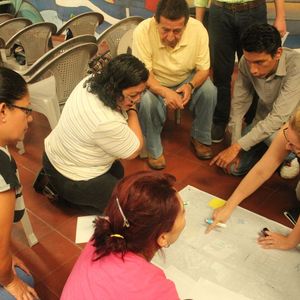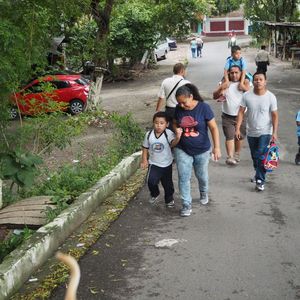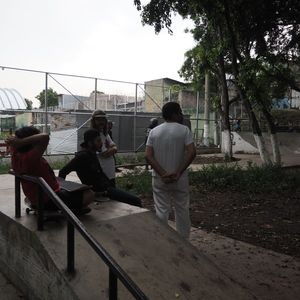Violence against Women in El Salvador
| Subject: International Cooperation
The AMB takes part in the project for safe, violence-free cities in San Salvador

The AMB has a signed an agreement with COAMSS/OPAMSS, the Council of Mayors and the Planning Bureau of San Salvador Metropolitan Area to work together in a project dedicated to safe and violent-free cities, particularly violence against women and youth.
The metropolitan area of San Salvador registers very high levels of violence, criminality and civil insecurity, which directly affect the guaranteed right to a life free of violence in a safe city.
Various studies and observatories validate this problem with truly alarming data: 47,000 homicides took place between 2000 and 2014 in San Salvador, which is considered the third most dangerous conurbation in the world. Surveys carried out to citizens also indicate this insecurity, with 90% of people stating they feel unprotected in public spaces and 62% of urban inhabitants consider it likely to become victims of theft, robbery or physical assault. Currently, in the metropolitan area of San Salvador, citizens perceive public spaces as areas of exposure and vulnerability.
In this context, violence against women is a significant problem in this territory. In 2016, El Salvador registered 524 feminicides (gender-based murders of women) while in the first quarter of 2017, there were 724 sexual assaults.
The streets, parks, squares and markets are designed with patriarchal parameters and do not take into account the interests and needs of women, to have the ability to enjoy human rights, especially a life free of violence.
Precisely, in this project, the public space is envisioned as a territory for relationships, cohesion and empowerment, where socioeconomic and cultural dynamism favours the construction of democratic and fairer cities.
This joint initiative has a double strategy: on the one hand, to strengthen institutional capacities of COAMSS/OPAMSS in planning and managing public spaces that are safe, democratic, inclusive and sustainable and, on the other hand, a practical intervention of two public spaces, integrating a participatory approach where people engage in different revitalization activities.
The last 30th of November, the final proposal of the participatory process was presented, together with the laying of the foundation stone in Zacamil Park (Mejicanos), where one of the two pilot tests will take place within the practical intervention phase.
Image gallery
Related documents
Related links
Where
















































